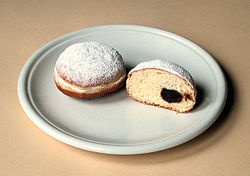Berliner (pastry)

|
|
| Alternative names | Berliner, Pfannkuchen, Krapfen |
|---|---|
| Type | Doughnut |
| Place of origin | Germany and Central Europe |
| Main ingredients | yeast dough, marmalade or jam, icing, powdered sugar or sugar |
| |
|
A Berliner Pfannkuchen (Berliner for short) is a traditional German pastry similar to a doughnut with no central hole, made from sweet yeast dough fried in fat or oil, with a marmalade or jam filling and usually icing, powdered sugar or conventional sugar on top. They are sometimes made with chocolate, champagne, custard, mocha, or advocaat filling, or with no filling at all.
The yeast dough contains a good deal of eggs, milk and butter. The classical Pfannkuchen made in Berlin the dough gets baled, deep-fried in lard, whereby the distinctive bright bulge occurs, and then filled with jam. The filling is related to the topping: for plum-butter, powdered sugar; for raspberry, strawberry and cherry jam, sugar; for all other fillings, sugar icing, sometimes flavoured with rum. Today the filling usually is injected with a large syringe or pastry bag after the dough is fried in one piece.
Today berliners can be purchased throughout the year, though they were traditionally eaten to celebrate on New Year's Eve (Silvester) as well as the carnival holidays (Rosenmontag and Fat Tuesday). A common German practical joke is to secretly fill some Berliners with mustard instead of jam and serve them together with regular Berliners without telling anyone.
The terminology used to refer to this delicacy differs greatly in various areas of Germany. While called Berliner Ballen or simply Berliner in Northern and Western Germany as well as in Switzerland, the Berliners themselves and residents of Brandenburg, Western Pomerania, Saxony-Anhalt and Saxony know them as Pfannkuchen, which in the rest of Germany generally means pancakes; pancakes are known there as Eierkuchen ("egg cakes").
...
Wikipedia
